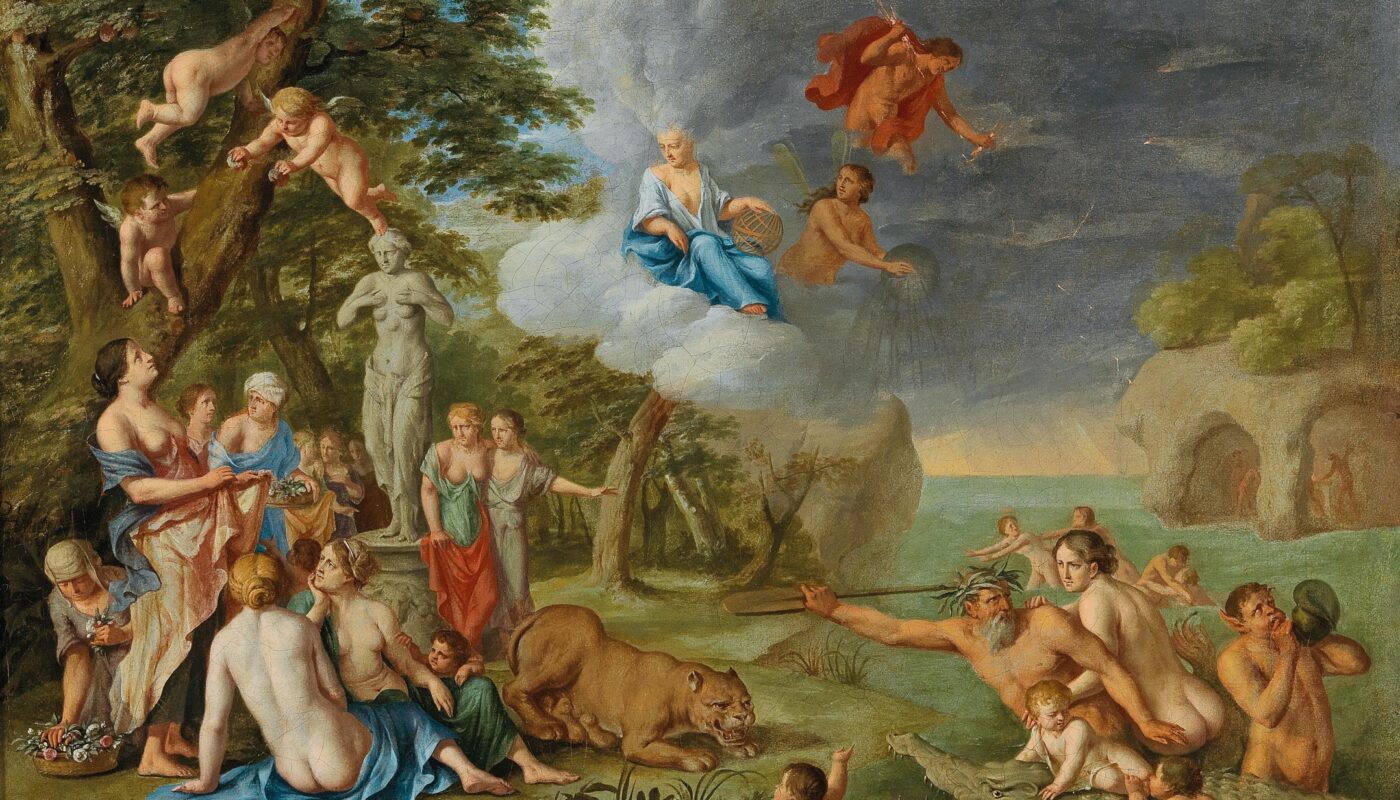Photo: The Feast of the Gods, Peter van Halen (Flemish, 1612 – 1687).
As part of my review process at the end of the year, I like to look back on the people, quotes, topics, and mental models which inspired me. These aren’t necessarily ideas first encountered this calendar year, but quotes, observances, and theories which showed up repeatedly in my reading and writing over the past twelve months. In no particular order, below are the twenty five ideas which have most impacted my thinking in this strange year of 2020.
Shallow or strong?
“Shallow men believe in luck…Strong men believe in cause and effect.” — Ralph Waldo Emerson
*
On the futility of anger:
“Why get angry at things, if anger doesn’t change it?
Why am I telling myself that I’ve been harmed?
Will I even remember this fight in a few months?”
From Ryan Holiday’s insightful piece on not letting Anger get the best of you.
*
Lessons from children: “A child can teach an adult three things: to be happy for no reason, to always be busy with something, and to know how to demand with all his might that which he desires.”— Paulo Coelho in The Fifth Mountain
*
Focus, not time: “Lack of direction, not lack of time, is the problem. We all have twenty-four hour days.” – Zig Ziglar.
We will always find the time to do what is important to us.
*
The importance of walking regularly: “We should take wandering outdoor walks, so that the mind might be nourished and refreshed by the open air and deep breathing.” —Seneca, On Tranquility of Mind.
My daily post-lunch walks, everyday, even when the day is wet and dreary like today, have been life-changing in providing clarity and calm.
*
The power of habit: “People do not decide their futures, they decide their habits and their habits decide their futures.” — F. M. Alexander
*
Take more shots: It appears that the rule of more shots on goal predicts success, even in Nobel laureates. Those who published more papers had more opportunities to refine their thinking and methods, and better work is the natural consequence. In other words, quantity produces quality.
*
“Uncomfortable, but not dangerous” from psychologist Nick Wignall.
Being in a new situation might be uncomfortable, and cause our anxieties kick in. That doesn’t mean the situation is dangerous, though, or that new things are liable to harm us. They are only unfamiliar and, therefore, uncomfortable. When you find yourself panicking in a new situation, remind yourself that you are in an uncomfortable place, but not a dangerous place.
*
“Not either-or, but both-and.“
When you are quick to view things as contrary pause and ask yourself: Might these actually be complements? Might both be true at once?
*
The OODA Loop; Observe – Orient – Decide – Act, developed by US Air Force Colonel John Boyd, a military strategist and Father of the F16. This framework explains how agility can overpower brute force. The person who moves through the loop most quickly can get inside the enemy’s loop, and gain the advantage. Originally conceived as a mental model for fighter pilots during dogfights, the principle continues to guide military tactical progressions today and has also been applied to business performance and strategy.
*
Speed and specific intention make history: I am amazed and inspired by the intention, precision, and speed with which Charles Lindbergh completed his historic trans-Atlantic flight. He contracted Ryan Airlines to custom build the Spirit of St. Louis in exactly sixty days. The seat in the cockpit was purposely built to be uncomfortable and keep Lindbergh awake during the flight. Then, Lindbergh surprised the world by completing the estimated forty hour flight from New York to Paris in just thirty-three and a half hours.
*
We must not be enemies. “We are not enemies, but friends. We must not be enemies. Though passion may have strained, it must not break our bonds of affection. The mystic chords of memory will swell when again touched, as surely they will be, by the better angels of our nature.” ― President Abraham Lincoln in his First Inaugural Speech
*
Because I chose it: New research shows we prioritize the things we choose, simply because we chose them.
*
A democratic education: “Education, once the peculiar privilege of the few, must in our best earthly estate become the valued possession of the many.” – John Heyl Vincent, founder of the Chautauqua movement.
*
Dramatic and heavenly architecture: This photo is from the interior of Cologne Cathedral in Cologne, Germany. It is one of the world’s most beautiful examples of Gothic architecture, famous for incorporating soaring pointed arches which symbolically guide the eye toward heaven.

*
A lack of idleness as the root of busyness:”The code of life in the High Middle Ages [held] that it was precisely lack of leisure, an inability to be at leisure, that went together with idleness; that the restlessness of work-for-work’s-sake arose from nothing other than idleness. There is a curious connection in the fact that the restlessness of a self-destructive work-fanaticism should take its rise from the absence of a will to accomplish something.” – Joseph Pieper, Leisure the Basis of Culture
*
Theodore Roosevelt’s “dashes”: While studying at Harvard, Roosevelt only spent a quarter of his day working on classwork. Taking the hours he was awake, and subtracting the time he was exercising or at meals, he would then devote the remaining time to working in sprints. He applied intense focus while he worked on coursework, then moved on to other things. This allowed him to maintain an impressive average, while also compiling a book, The Summer Birds of the Adirondacks.
*
Tradition is Smarter than You Are, aka, Chesterton’s Fence.
“If you don’t see the use of it, I certainly won’t let you clear it away. Go away and think. Then, when you can come back and tell me that you do see the use of it, I may allow you to destroy it.” —G.K. Chesterton, The Thing (1929).
Much of what makes a society successful is knowledge of the tacit sort: rarely articulated, messy, and from the outside looking in, purposeless. These are the first things lost in the quest for legibility. Traditions, small cultural differences, odd and distinctive lifeways […] are all swept aside by a rationalizing state that preserves (or in many cases, imposes) only what it can be understood and manipulated from the 2,000 foot view.
*
What makes a classic? “A classic is a book that has never finished saying what it has to say.” – Italo Calvino.
*
Winter walks: The inspiring adopter and advocate of the simple and rugged life, Henry David Thoreau on winter walks: “Take long walks in stormy weather or through deep snows in the fields and woods, if you would keep your spirits up. Deal with brute nature. Be cold and hungry and weary.” Thoreau’s passion for nature and simplicity inspired me this year to get outside and breathe fresh air and observe the trees, plants, animals, and sounds as I walk outside, every single day, rain or shine. I’ve learned in 2020 that I must have fresh air, must get outside and move and feel the warmth of the sun every day. We, you and I, are part of nature, not nature-adjacent.
*
What is leisure? A common question over the course of the year – how do we Americans build more leisure into our daily lives? Perhaps we take lunch more seriously, and much slower. Lunchtime is sacred in France, and most French people and businesses will not be disturbed for at least 2 hours, usually from noon to 2pm, every day.
*
Community is the price of staggered work hours: “What makes the changing cadences of labor most nepreryvka-like, however, is that they divide us not just at the micro level, within families and friend groups, but at the macro level, as a polity. Staggered and marathon work hours arguably make the nation materially richer—economists debate the point—but they certainly deprive us of what the late Supreme Court Justice Felix Frankfurter described as a “cultural asset of importance”: an “atmosphere of entire community repose.” “
From Judith Shulevitz’s “Why You Never See Your Friends Anymore” for The Atlantic.
*
Intellectual humility: “The chief deficiency I see in the skeptical movement is its polarization: Us vs. Them—the sense that we have a monopoly on the truth; that those other people who believe in all these stupid doctrines are morons; that if you’re sensible, you’ll listen to us; and if not, to hell with you. This is nonconstructive. It does not get our message across. – Carl Sagan
*
The 90-9-1 Rule: In social media networks, 90% of users just read content, 9% of users contribute a little content, and 1% of users contribute almost all the content. Gives a false impression of what ideas are popular or “average.”
*
False humanitarianism: “True humanitarianism is sympathy with all human beings; false humanitarianism is sympathy with those particular human beings whom you choose to regard as oppressed or deserving of sympathy.” — G.K. Chesterton




